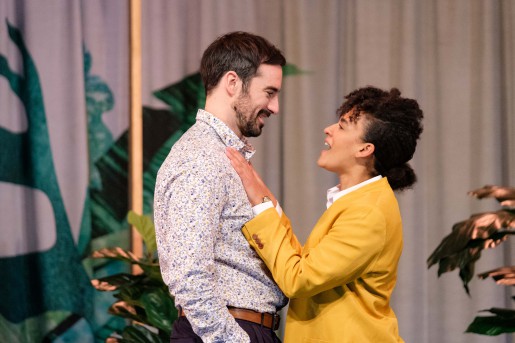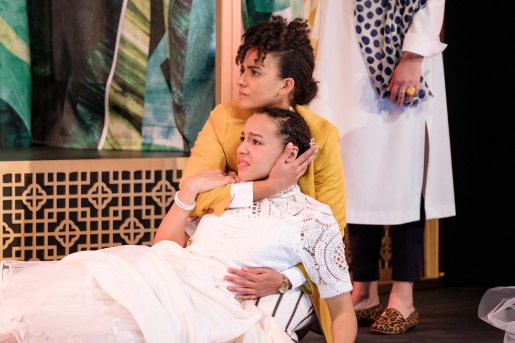Playhouse, October 24
4.5/10
Here was a curiosity: a show disarmingly similar to William Shakespeare’s play of the same name. The words were identical, and arrived in more or less the same order. Moreover it, too, was a comedy, generating several smiles and one really good laugh, and so it was intermittently entertaining enough. But it was not Much Ado About Nothing. That is a play primarily about Beatrice and Benedick, the former a greater wit and the latter a lesser one, who verbally spar with each other by inclination and to save their hearts from being hurt. The play survives because of them (with Anna Volska and Peter Carroll standing out in the history of Sydney incarnations).

Here that Beatrice was absent. Zindzi Okenyo delivered her lines, but no sparks flew, no bubbles effervesced and no charm bathed the audience. Okenyo’s was a rather sullen, drab, world-weary character, which is not Beatrice at all, because the play rides on the magic carpet of her vivacity. Compounding this, the moment in which Okenyo could have truly touched us was lightly thrown away: the little pool of poignancy when Beatrice dares to reveal her underbelly concerning Benedick’s heart (“Indeed, my lord, he lent it me awhile…”).
Without Beatrice’s buoyant counterweight, what does it matter how Duncan Ragg’s Benedick measured on the scales? He was a Hardy without a Laurel; a fencer with no foe. In the event Ragg’s was an odd characterisation, anyway: a nerdy country bumpkin whose trousers were as short as his voice was high. Why, one wondered, would the feisty Beatrice – the play’s supreme intellect – care a fig about this prat-falling clown? Nonetheless Ragg imbued him with an aptly glowing heart, and had the flair to generate genuine amusement in the role, aided by director James Evans (for Bell Shakespeare) handing him a good deal of the more comical stage business to transact.

Evans’s hit-and-miss casting included Vivienne Awosoga bringing fluency and substance to Hero, the blameless ingenue, and Paul Reichstein being singularly convincing as the dastardly Don John (plus a bumbling member of the Watch). In a production where generating laughs mostly equated to shameless hamming, Reichstein dared to underplay the villain; dared to trust the text. Other than David Whitney emerging unscathed from the rather thankless role of Leonato, most were not so lucky, with Will McDonald’s youthful Claudio so over-excited that were I his doctor I’d have had him on Valium in a flash, and Danny Ball lacking command of the language as Don Pedro.
Mandy Bishop donned jodhpurs, boots and leathers as Dogberry, the addled constable with the gift for speaking in opposites while stumbling across heinous plots. Here Shakespeare’s wafer-thin verbal comedy demands a thick slice of Parma ham to make the scenes work, and Bishop’s moustachioed, winking Dogberry duly obliged, squeezing out more smiles than light up the written page. Marissa Bennett could make nothing of Verges, Dogberry’s sidekick, however, although she was a sprightly Margaret. Finally Suzanne Pereira seemed to be paddling upstream as the gender-swapped Antonio and Friar.
Evans’ overwhelming strength in this production – contriving comedic business – was undermined by casting and performance issues, and by his staging of the straighter ensemble scenes, in which the actors tended to stand and woodenly declaim on Pip Runicman’s intentionally grotesque design. This looked like a bad dream of an RSL club (expertly lit by Niklas Pajanti), with the odd delightful touch in the costuming. Andree Greenwell’s score, meanwhile, elicited some commendable ensemble singing.
Until November 24.